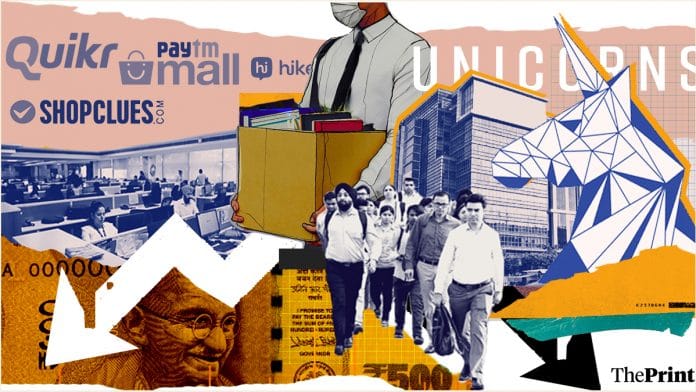New Delhi: As the year comes to an end, the number of unicorns in India has slid from a peak of 105 in September to just 84, says the latest data. The number is set to drop further in the new year, according to experts in the start-up ecosystem.
The headiness and euphoria of 2021-22 had to inevitably begin fading at some point, industry participants and watchers told ThePrint saying that a lot of mergers and consolidations are expected in the coming year, which will further reduce the number of companies valued so high.
Another factor that can potentially reduce the numbers is an increase in the number of owners choosing to list themselves on stock exchanges, which automatically disqualify them from the tag of unicorn.
A report published in private market tracker Venture Intelligence in October 2022 says that the number of unicorn start-ups (with a valuation of $1 billion) in India has decreased from 105 to 84 currently, which is confirmed by accounting and consulting giant PricewaterhouseCoopers (PwC) that also pegs the latest number of active unicorns at 84.
As per the Venture Intelligence report, some of the unicorns that have lost their status include Hike, Quikr, Shopclues, Snapdeal and Paytm Mall. They lost their seats on the unicorn high table as their valuation fell below $1 billion.
There are some others such as Flipkart, Nykaa, Blinkit, Delhivery, Billdesk, Zomato, Policy Bazaar, Freshworks, and Paytm that stopped being unicorns because they have now become publicly listed or have been acquired by publicly-listed companies.
A unicorn start-up is a privately held company with a valuation of $1 billion or more and is funded using venture capital. Once the company loses its valuation of $1 billion, it is no longer called a unicorn. The term ‘unicorn’ had surfaced in the last decade after Aileen Lee, founder of a Palo-Alto based venture capital, used it in an article about tech start-ups.
Also Read: Everyone loves an Indian start-up success story. Not too many know that 2,000 failed last year
Vanishing unicorns
According to the PwC report, the third quarter of 2022 saw only two new unicorns being added to the list, while 23 fell by the wayside. This marks a significant slowdown in the addition of new unicorns and an acceleration in the number exiting the list.
Venture Intelligence found that 2021 saw the largest number of unicorns being added to the list since 2015. It showed that 44 new unicorns were added to India’s tally in 2021, with new additions dropping to 20 in 2022 as of September-end.
According to the report, the most number of unicorns (21) came from the B2B e-commerce sector, followed by 18 from fintech.
Among the cities, Bengaluru is home to the most number of unicorns at 41, followed by Delhi-NCR 25, Mumbai 19, Pune 7 and other cities (3). Within Delhi-NCR, Noida accounted for 6, Delhi 8 and Gurugram 14 with the numbers comprising both active uniforms and those who lost the tag.
“Funding winter continues in India’s start-up ecosystem as well as globally and it’s uncertain until when this will last,” PwC’s Start-up Perspectives report for the third quarter of this calendar year said. “Start-up funding in India during Q3 (July to September) in 2022 hit a two-year low at $2.7 billion across 205 deals.”
Talking about the top three sectors–FinTech, Saas (Software as a Service) and Edtech, the PwC report said the fintech sector contributed to 30 per cent of the total funding during Q3 in 2022, although there was a 60 per cent decline in the funds raised for fintech start-ups in Q3 2022 compared to the previous quarter.
For the SaaS sector, the report said that a “decline was noted both in value as well as volume terms in Q3 in the year 2022 compared to Q2.”
Over-inflated valuations
However, not all of this is attributable to the vagaries of the market. There is a strong element of merit as well.
“Since the start of 2022, we have seen that the market has already started distinguishing companies that have toiled from the ones that got lucky,” Ashish Dave, CEO of Mirae Asset Venture Investments (India) is quoted as saying in the same report. “Markets have separated the process-driven unicorns from the rest.”
“In 2021, there was a lot of liquid cash in the market and instead of investing in debt bonds, the investors started putting in their money in equities, which is why more money was invested in start-ups and many of them ended up becoming unicorns,” a Delhi-based lawyer who advises start-ups explained. “We were not supposed to have so many unicorns in the first place.”
Economies are now correcting themselves across the world, including in India, and so many companies will lose their valuations, he added.
Another well-known investor, who spoke to ThePrint on the condition of anonymity given the sensitivity of the issue and the impact this can have on markets, said a lot of consolidation is expected in the coming days and is worried it can send the market into a panic.
“The coming year will be a year of consolidations. There will be a lot of mergers and acquisitions,” the investor said. “This will also expose the valuation of a lot of companies. The ones that pegged themselves at a higher value will find out their real value once they are being bought. Because buying is the real test of valuation, not IPO.”
(Edited by V. S. Chandrasekar)
Also Read: Edtech start-ups funding down 50% in Q2 2022 from Q1, report says. Insiders blame ‘bad phase’






